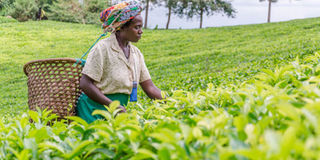Shs11.6b tea factory to be constructed in western Uganda starting January

A woman pick tea in a tea plantations. COURTESY PHOTO
What you need to know:
- Kayonza Growers Tea Factory is situated in Kanungu District, Butogota Town Council, 25kms to the famous home of the mountain gorillas, Bwindi National Park in the south western Uganda.
- Fully owned by 5617 small scale shareholders where shares are acquired through monthly deductions from their pay for green leaf delivered to the factory.
- Kayonza manufactures Black CTC (Cut, Tear, Curl) teas with made tea production of 3,000 tonnes annually. Primary grades (BP1, PF1, PD and D1) make about 90 per cent and Secondary grades (BP, PF, D, BMF and F1) make 10 per cent of the total production.
- Its tea is popular for its quality. The leaf is known to be neat, clean, black and well sorted to grade. The infusions are quite bright while the liquors are bright and strong, high quality appreciated by various markets
Source: Uganda Tea Development Agency Ltd – UTDAL
At least $3.15million ( about Shs11.6billion) has been negotiated for investment into Kayonza Growers Tea Factory located in Western Uganda, according to Solidaridad, an international civil society organisation whose interest among other things include developing strong supply agricultural chain and supporting farmers around the world to become financially robust.
The investment facilitated by Solidaridad, for financing of the tea processor based in Kanungu is in the form of a long-term loan from social impact investor Oikocredit.
“This will allow Kayonza to build a second factory to process the soaring tea yields for the benefit of the 7,500 smallholder farmers who own the tea processor,” reads a press statement issued by Solidaridad Regional Communications Officer, Ms Elaine Muigai earlier in the week.
Worth noting is that Kayonza is the first UNDP Equator Prize winner and the first project in Solidaridad’s impact investment pipeline to win financing.
As a result, the new plant in nearby Mpungu Is also expected to reap from the move by doubling Kayonza’s capacity to 38,000 metric tonnes per year, allowing the processor to make the most of growing international demand and government support of the tea industry.
With financing issues now being the least of the problem, construction of the company according to the statement will begin in January 2020.
“As soon as we get the funds, we will roll into action,” confirms Christopher Turyatemba, General Manager of Kayonza Tea Factory. “In two years’ time, the satellite factory will be a reality for the Mpungu community.”
Kayonza is currently running at full capacity. Deliveries to the processing plant in the highlands of southwestern Uganda have risen by 60 per cent since 2016. Its suppliers – smallholders mostly farming one and two hectare plots – are achieving higher yields.
Solidaridad’s tea experts from East Africa and India assessed whether Kanungu based tea processor’s yields warranted a second factory in addition to ensuring if the projected machinery costs were realistic.
Once the aforementioned were ascertained and all other requirements ticked the box, the tea processor was introduced to the potential investors.
Importantly perhaps, to qualify for financing, Kayonza’s focus on social impact had to be appealing to Oikocredit, and thankfully it did, not to mention its strong business plan as well.
The tea processor won the United Nations Development Programme’s (UNDP) Equator Prize in 2015. UNDP selected Kayonza for its efforts to help its local community to adapt to climate change, drive back deforestation and soil degradation, and encourage local people to adopt land management techniques and diversify their crops.
The Global Head of Policy at Solidaridad, Frederik Claasen, was quoted in a statement as saying: “It has been exciting to see the different parties contribute their expertise to help this deal come to fruition. Leveraging 50 years of working with farmers around the world, we are now seeking to partner with impact investors and have already built a pipeline of 67 projects we are developing to get ready for investments.”
Geoffrey Musyoki, Agriculture Loans Specialist at Oikocredit, added: “Our investments prioritize social impact while safeguarding the environment and generating fair financial returns. In this regard, Kayonza is an excellent match for Oikocredit. Our investment will allow Kayonza to boost its position in the global tea trade, giving the new factory the potential to be a huge catalyst for development in the area.”
As for Martin Sommerschuh, Coordinator of the Equator initiative at UNDP, Kayonza, provides both a need and an opportunity before noting that, excitingly, it’s the first time an Equator Prize winner has secured external financing since it was established in 2002.




